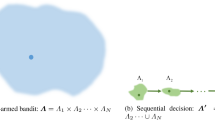Abstract
In the last few years, we have witnessed a resurgence of interest in neural networks. The state-of-the-art deep neural network architectures are however challenging to design from scratch and requiring computationally costly empirical evaluations. Hence, there has been a lot of research effort dedicated to effective utilisation and adaptation of previously proposed architectures either by using transfer learning or by modifying the original architecture. The ultimate goal of designing a network architecture is to achieve the best possible accuracy for a given task or group of related tasks. Although there have been some efforts to automate network architecture design process, most of the existing solutions are still very computationally intensive. This work presents a framework to automatically find a good set of hyper-parameters resulting in reasonably good accuracy, which at the same time is less computationally expensive than the existing approaches. The idea presented here is to frame the hyper-parameter selection and tuning within the reinforcement learning regime. Thus, the parameters of a meta-learner, RNN, and hyper-parameters of the target network are tuned simultaneously. Our meta-learner is being updated using policy network and simultaneously generates a tuple of hyper-parameters which are utilized by another network. The network is trained on a given task for a number of steps and produces validation accuracy whose delta is used as reward. The reward along with the state of the network, comprising statistics of network’s final layer outcome and training loss, are fed back to the meta-learner which in turn generates a tuned tuple of hyper-parameters for the next time-step. Therefore, the effectiveness of a recommended tuple can be tested very quickly rather than waiting for the network to converge. This approach produces accuracy close to the state-of-the-art approach and is found to be comparatively less computationally intensive.
Access this chapter
Tax calculation will be finalised at checkout
Purchases are for personal use only
Similar content being viewed by others
References
Ali, A., Budka, M., Gabrys, B.: Towards meta-level learning of deep neural networks for fast adaptation. In: Proceedings of the 16th Pacific RIM International Conference on Artificial Intelligence (PRICAI) (2019)
DeVries, T., Taylor, G.W.: Improved regularization of convolutional neural networks with cutout. Computing Research Repository (CoRR) arXiv:1708.04552 (2017)
Duan, Y., Schulman, J., Chen, X., Bartlett, P.L., Sutskever, I., Abbeel, P.: RL2: fast reinforcement learning via slow reinforcement learning. Computing Research Repository (CoRR) arXiv:1611.02779 (2016)
Finn, C., Abbeel, P., Levine, S.: Model-agnostic meta-learning for fast adaptation of deep networks. In: Proceedings of the 34th International Conference on Machine Learning, vol. 70, pp. 1126–1135. PMLR, International Convention Centre, Sydney, August 2017
Finn, C., Levine, S.: Meta-learning and universality: deep representations and gradient descent can approximate any learning algorithm. Computing Research Repository (CoRR) arXiv:1710.11622 (2018)
Glorot, X., Bengio, Y.: Understanding the difficulty of training deep feed-forward neural networks. In: Proceedings of the Thirteenth International Conference on Artificial Intelligence and Statistics. PMLR (2010)
He, K., Zhang, X., Ren, S., Sun, J.: Deep residual learning for image recognition. In: 2016 IEEE Conference on Computer Vision and Pattern Recognition (CVPR), pp. 770–778 (2016)
Hochreiter, S., Schmidhuber, J.: Long short-term memory. Neural Comput. 9, 1735–1780 (1997)
Huang, G., Sun, Y., Liu, Z., Sedra, D., Weinberger, K.: Deep networks with stochastic depth. Computing Research Repository (CoRR arXiv:1603.09382 (2016)
Ioffe, S., Szegedy, C.: Batch normalization: accelerating deep network training by reducing internal covariate shift. In: International Conference of Machine Learning (ICML) (2015)
Kingma, D.P., Ba, J.: Adam: a method for stochastic optimization. In: International Conference on Learning Representations (ICLR) (2015)
Krizhevsky, A., Nair, V., Hinton, G.: CIFAR-10 and CIFAR-100. Canadian Institute for Advanced Research
Le, Y., Yang, X.: Tiny ImageNet visual recognition challenge. Stanford CS 231N (2015)
LeCun, Y., Cortes, C., Burges, C.J.C.: The MNIST dataset of handwritten digits (1999)
Liu, C., Zoph, B., Neumann, M., et al.: Progressive neural architecture search. Computing Research Repository (CoRR) arXiv:1712.00559 (2018)
Nair, V., Hinton, G.E.: Rectified linear units improve restricted Boltzmann machines. In: International Conference of Machine Learning (ICML) (2010)
Pham, H., Guan, M.Y., Zoph, B., Le, Q.V., Dean, J.: Efficient neural architecture search via parameter sharing. Computing Research Repository (CoRR) arXiv:1802.03268 (2018)
Ravi, S., Larochelle, H.: Optimization as a model for few-shot learning. In: International Conference on Learning Representations (ICLR) (2017)
Sutskever, I., Martens, J., Dahl, G., Hinton, G.E.: Practical network blocks design with Q-learning. In: International Conference of Machine Learning (ICML) (2013)
Sutton, R.S., McAllester, D., Singh, S., Mansour, Y.: Policy gradient methods for reinforcement learning with function approximation. In: NIPS (1999)
Williams, R.J.: Simple statistical gradient-following algorithms for connectionist reinforcement learning. Mach. Learn., 41–49 (2019)
Xiao, H., Rasul, K., Vollgraf, R.: Fashion-MNIST: a novel image dataset for benchmarking machine learning algorithms. Computing Research Repository (CoRR) arXiv:1708.07747 (2017)
Xu, T., Liu, Q., Zhao, L., Peng, J.: Learning to explore with meta-policy gradient. Computing Research Repository (CoRR) arXiv:1803.05044 (2018)
Zoph, B., Le, Q.V.: Neural architecture search with reinforcement learning. In: International Conference on Learning Representations (ICLR) (2017)
Zoph, B., Vasudevan, V., Shlens, J., Le, Q.V.: Learning transferable architectures for salable image recognition. In: Computer Vision and Pattern Recognition (CVPR) (2018)
Author information
Authors and Affiliations
Corresponding author
Editor information
Editors and Affiliations
Rights and permissions
Copyright information
© 2019 Springer Nature Switzerland AG
About this paper
Cite this paper
Ali, A.R., Budka, M., Gabrys, B. (2019). A Meta-Reinforcement Learning Approach to Optimize Parameters and Hyper-parameters Simultaneously. In: Nayak, A., Sharma, A. (eds) PRICAI 2019: Trends in Artificial Intelligence. PRICAI 2019. Lecture Notes in Computer Science(), vol 11671. Springer, Cham. https://doi.org/10.1007/978-3-030-29911-8_8
Download citation
DOI: https://doi.org/10.1007/978-3-030-29911-8_8
Published:
Publisher Name: Springer, Cham
Print ISBN: 978-3-030-29910-1
Online ISBN: 978-3-030-29911-8
eBook Packages: Computer ScienceComputer Science (R0)




